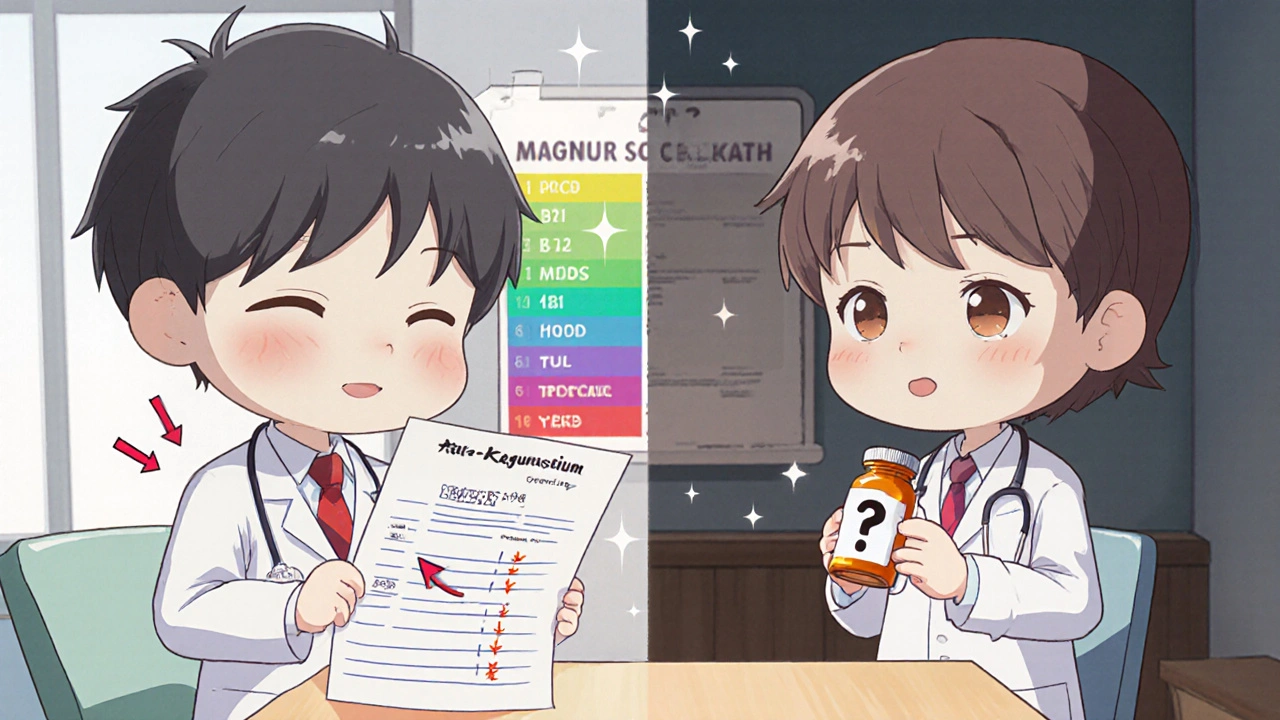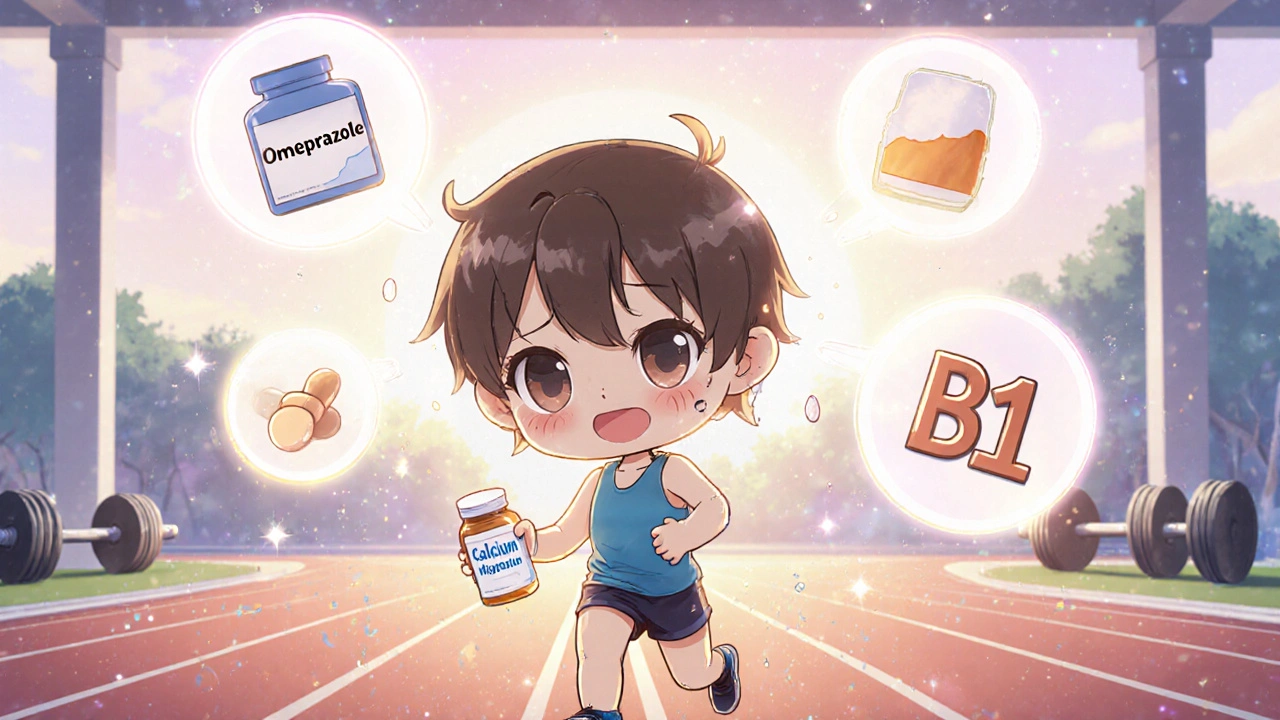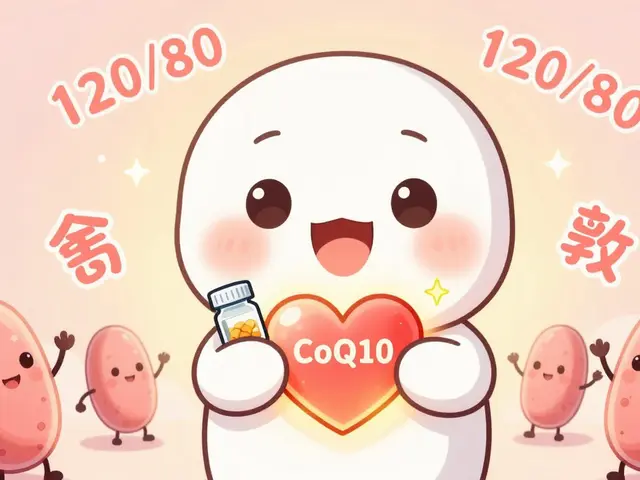Many people take omeprazole to manage heartburn, GERD, or ulcers. It’s a common medication, often prescribed for weeks or even years. But if you’re active-lifting weights, running, cycling-you might have noticed something off. Maybe your workouts feel harder. Maybe you’re more tired than usual. Or your muscles don’t recover like they used to. Could omeprazole be the hidden culprit?
How Omeprazole Works
Omeprazole is a proton pump inhibitor (PPI). It shuts down the acid-producing pumps in your stomach lining. Less acid means less burning, less reflux, and fewer ulcers. That’s good for your digestive system. But your body doesn’t just make acid to cause problems. Stomach acid plays a key role in digestion, nutrient absorption, and even protecting you from harmful bacteria.
When you take omeprazole daily, your stomach’s pH rises from around 2 (very acidic) to 5 or higher. That might sound harmless, but it changes how your body handles food and supplements. And that ripple effect can show up in your gym performance.
The Nutrient Connection
Your muscles need more than protein shakes and rest. They need calcium, magnesium, iron, and vitamin B12. These don’t just appear in your bloodstream. They need stomach acid to be broken down and absorbed properly.
- Calcium and magnesium rely on acid to dissolve into absorbable forms. Low acid = less uptake. That can lead to muscle cramps, slower recovery, and even reduced strength gains.
- Iron absorption drops by up to 70% with long-term PPI use. Iron deficiency means less oxygen delivery to muscles. You’ll feel winded faster, even on easy runs.
- Vitamin B12 requires acid to separate from food proteins. Without it, levels drop over time. B12 deficiency causes fatigue, brain fog, and nerve issues-all of which hurt workout consistency.
A 2020 study in the Journal of Clinical Gastroenterology found that people on PPIs for over a year had significantly lower serum levels of magnesium and B12 compared to non-users. The effects were more pronounced in active adults who didn’t supplement strategically.
Exercise Performance and Fatigue
It’s not just about nutrients. Omeprazole can also change how your body handles stress during exercise.
When you lift heavy or run hard, your body releases cortisol. That’s normal. But long-term acid suppression may interfere with how your adrenal glands respond. Some users report feeling unusually drained after workouts, even when their training load hasn’t changed.
Also, low stomach acid can lead to bacterial overgrowth in the small intestine (SIBO). Symptoms include bloating, gas, and nausea-especially during or after exercise. Many athletes mistake this for "just being out of shape" or "eating too close to a workout." But if you’re on omeprazole and suddenly feel sick when you run, it might be gut-related.

Recovery and Muscle Growth
Muscle repair needs protein. But protein digestion starts in the stomach. Without enough acid, protein doesn’t break down into amino acids efficiently. That means fewer building blocks reach your muscles after a workout.
One small 2021 trial with 48 healthy men showed that those taking omeprazole absorbed 22% less leucine-a critical amino acid for muscle synthesis-after a protein meal compared to those not on PPIs. That’s not a huge number, but over weeks and months, it adds up. You’re not gaining muscle as fast as you could be.
And here’s something most people don’t think about: your gut microbiome. Omeprazole alters the balance of gut bacteria. A 2023 study in Nature Communications linked long-term PPI use to reduced diversity in gut microbes linked to athletic recovery. Less diversity = slower inflammation control = longer soreness.
What You Can Do
You don’t have to quit omeprazole. But you do need to work smarter.
- Talk to your doctor about dose and duration. Are you still taking it because you need it-or because you’ve forgotten to reassess? Many people stay on PPIs longer than necessary. Your doctor can help you try tapering or switching to an H2 blocker like famotidine, which is less disruptive to nutrient absorption.
- Take supplements with food. If you’re supplementing with magnesium, calcium, or iron, take them with meals. The natural acid from eating helps absorption better than taking them on an empty stomach.
- Choose chelated forms. Look for magnesium glycinate, iron bisglycinate, or calcium citrate. These forms don’t rely as much on stomach acid to be absorbed.
- Consider a B12 supplement. Sublingual B12 (under the tongue) bypasses the stomach entirely. 1,000 mcg daily is a common dose for those on long-term PPIs.
- Monitor your symptoms. Keep a log: workout intensity, fatigue levels, cramps, digestion. If things improve after adjusting supplements or reducing omeprazole, you’ve found your answer.

When to Be Concerned
Not everyone on omeprazole will have fitness issues. But if you’re experiencing:
- Unexplained fatigue that doesn’t improve with rest
- Frequent muscle cramps or weakness
- Slow recovery despite good sleep and nutrition
- Stomach bloating or nausea during workouts
...it’s time to dig deeper. Ask your doctor for blood tests: serum magnesium, iron, ferritin, B12, and vitamin D. These are simple, inexpensive checks that can reveal hidden problems.
Alternatives and Lifestyle Shifts
If your GERD or heartburn is mild, lifestyle changes can make a big difference:
- Avoid eating 3 hours before bed
- Elevate the head of your bed by 6 inches
- Limit caffeine, alcohol, spicy foods, and large meals
- Manage stress-high cortisol worsens reflux
- Try ginger tea or licorice root (DGL) before meals
Some people find relief with apple cider vinegar or betaine HCl supplements, but these aren’t for everyone. Talk to your doctor before trying them, especially if you have ulcers or gastritis.
Bottom Line
Omeprazole isn’t evil. It’s a life-changing drug for people with serious acid-related conditions. But for athletes and active people, it’s not a neutral tool. It changes how your body absorbs what it needs to perform and recover. If you’re taking it long-term and wondering why your gains have stalled, the answer might not be in your training plan-it might be in your pill bottle.
Don’t stop taking it without medical advice. But do ask the right questions. Get tested. Adjust your nutrition. And give your body the tools it needs to keep up with your goals.
Can omeprazole cause muscle weakness?
Yes, indirectly. Omeprazole can reduce absorption of magnesium and calcium, both critical for muscle function. Low levels of these minerals can lead to cramps, spasms, and general weakness. Long-term users may also develop vitamin B12 deficiency, which affects nerve signaling to muscles. If you’re experiencing unexplained muscle weakness, ask your doctor to check your serum levels.
Does omeprazole affect protein absorption?
It can. Stomach acid is needed to break down protein into amino acids. Omeprazole reduces acid production, which may slow this process. One study showed a 22% drop in leucine absorption after a protein meal in people taking omeprazole. For athletes, this means fewer building blocks for muscle repair. Taking protein with meals and choosing easily digestible sources like whey or hydrolyzed protein can help.
Is it safe to take magnesium supplements with omeprazole?
Yes, and it’s often recommended. Omeprazole increases the risk of magnesium deficiency. Taking a chelated form like magnesium glycinate or magnesium citrate with food improves absorption. Avoid magnesium oxide-it’s poorly absorbed and can cause diarrhea. Aim for 300-400 mg daily, but check with your doctor if you have kidney issues.
Can omeprazole cause fatigue during workouts?
Absolutely. Fatigue can stem from low iron (leading to anemia), low B12 (causing nerve and energy issues), or even gut bacterial changes that increase inflammation. Many people assume they’re just "out of shape," but if fatigue started after beginning omeprazole, the timing matters. Get your iron, ferritin, and B12 levels tested.
Should I stop omeprazole to improve my fitness?
Never stop without talking to your doctor. But if your reflux is mild, you might be able to reduce the dose or switch to an H2 blocker like famotidine, which has less impact on nutrient absorption. Many people can eventually stop PPIs entirely with lifestyle changes-elevating the bed, avoiding late meals, losing weight if needed. Your doctor can help you create a safe tapering plan.




Look, we’re all chasing gains, but nobody talks about how our meds are silently sabotaging us. Omeprazole isn’t just reducing acid-it’s turning your gut into a nutrient desert. I’ve been on it for three years, and my deadlift plateaued right when my B12 dropped below 200. No one told me to test it. Just kept telling me to ‘train harder.’
Turns out, I wasn’t lazy. I was deficient. Started sublingual B12, switched to magnesium glycinate, and boom-energy came back. Not magic. Just chemistry. Your body doesn’t care about your rep scheme if it’s running on fumes.
Stop blaming your workout. Start blaming your pill bottle.
Who even needs muscle anyway? The real win is not having heartburn while eating pizza at 2am. If you’re lifting because you think it makes you a better person, you’re already lost.
Also, America’s obsession with ‘optimizing’ everything is ridiculous. Just eat more meat. Problem solved. No supplements needed. Just stop being so weak.
While the physiological mechanisms described in the post are largely accurate, it is important to emphasize that the clinical significance of reduced nutrient absorption in asymptomatic individuals remains debated. The 22% reduction in leucine absorption cited from the 2021 trial was observed under controlled conditions with a single meal, and extrapolation to long-term athletic performance requires longitudinal data not yet available.
Furthermore, serum magnesium levels are not a reliable biomarker for intracellular magnesium status, and supplementation without confirmed deficiency may confer no benefit and potential risk. A more prudent approach involves individualized risk-benefit analysis rather than generalized recommendations.
ok so like… i’ve been on this crap for 5 years and my legs cramp like im 80 and i thought it was just aging??
turns out my body is just slowly dying from a pill i took for heartburn after tacos??
also why does everyone act like doctors are gods? i asked mine about b12 and she said ‘oh you’re fine’ and gave me a coupon for kale smoothies. like bro i’m running 5k’s and i feel like a zombie. this is not fine.
also i think big pharma is hiding this. why? because they make more money selling you pills than telling you to stop eating pizza at midnight.
So let me get this straight-your body’s natural acid is the enemy, but you’re fine with swallowing a chemical that turns your gut into a sterile wasteland so you can eat nachos at midnight?
What’s next? Taking antibiotics before every meal to kill ‘bad bacteria’? Oh wait, we already do that.
They told us cholesterol was bad. Then it wasn’t. Now stomach acid is the villain? Next they’ll say sunlight causes cancer and we should all live in basements.
Wake up. This isn’t medicine. It’s corporate control dressed in white coats.
This is such an important conversation. I’m a coach and I’ve seen too many athletes burn out thinking they’re not trying hard enough-when really, their body’s just running on empty.
One client, 34, ultra-runner, took omeprazole for years because ‘it helped with reflux.’ She was exhausted, her hair was falling out, she couldn’t recover from long runs. We tested her iron, ferritin, B12-everything was in the basement.
We switched her to famotidine, started her on chelated magnesium and sublingual B12, and cut out late-night meals. Within six weeks, she ran a PR. Not because she trained harder. Because she finally fed her body right.
Don’t just ‘push through.’ Test. Adjust. Listen to your body. You’re not broken. Your system just needs the right fuel.
Let me tell you what I’ve seen in the gym over the last decade. People think protein powder and creatine are the keys to growth. Nah. The real secret is what’s happening in your stomach before that protein even hits your bloodstream.
I had a guy come in-strong, disciplined, 5 days a week. But his gains stalled. He was on omeprazole for ‘acid reflux’ since college. We got his labs done: B12 at 180, magnesium at 1.4 (normal is 1.7–2.2), ferritin at 12.
He started taking his magnesium with dinner, switched to iron bisglycinate, and took B12 under his tongue. Three months later, he added 20 lbs to his squat and stopped needing naps after workouts.
This isn’t theory. It’s practice. Your gut is your second brain-and your third muscle. Treat it like one.
They don’t want you to know this because if everyone stopped taking omeprazole, the pharma giants would lose billions. And who profits? The supplement companies selling you $40 magnesium pills. Same system, different label.
But here’s the truth-your ancestors didn’t take pills for heartburn. They ate fermented food, didn’t eat after sunset, and chewed their food like it owed them money.
Why are we so afraid of discomfort? Heartburn isn’t a disease-it’s a signal. Your body’s screaming, ‘I’m overloaded!’ And instead of listening, you silence it with a chemical leash.
Next time you feel that burn, don’t swallow. Sit. Breathe. Walk. Drink ginger tea. Let your body fix itself. It’s been doing it for 10,000 years. You just forgot how.
The article presents a non-peer-reviewed synthesis of observational data and anecdotal evidence, framed as clinical guidance. While the physiological mechanisms underlying proton pump inhibitor-induced nutrient malabsorption are documented, the causal attribution to athletic performance decline remains correlational at best.
Furthermore, the recommendation to discontinue or reduce PPI therapy without medical supervision constitutes a potentially dangerous deviation from established clinical protocols. The risk of rebound acid hypersecretion, esophagitis, and Barrett’s esophagus is nontrivial.
As a medical professional, I urge readers to consult a gastroenterologist before altering medication regimens. Supplementation without diagnostic confirmation may mask underlying pathology.
OMG I thought I was just getting old. I’ve been on omeprazole for 4 years and my legs cramp during yoga, I’m always tired, and I can’t recover from my runs. I just assumed it was stress or bad sleep.
Just got my blood work done-B12 was 190, ferritin 8. I started sublingual B12 and magnesium glycinate yesterday. Felt a difference in energy by day 3. I’m so mad I didn’t test sooner.
To anyone reading this: don’t wait. Get tested. It’s cheap. It’s simple. Your body is trying to tell you something.
There’s a deeper layer here. We’ve outsourced our biology to chemistry. We treat symptoms as enemies instead of signals. Omeprazole doesn’t cause weakness-it reveals weakness we’ve ignored for years.
Our culture says: ‘If it hurts, take a pill.’ But what if the pain is the compass? What if the fatigue isn’t laziness but your body saying, ‘I’m not getting what I need’?
We optimize workouts, diets, sleep trackers-but never ask why our stomachs became so fragile in the first place. Maybe the problem isn’t acid. Maybe it’s everything else we’ve fed ourselves-literally and metaphorically.
Healing isn’t just about reversing deficiency. It’s about relearning how to live.